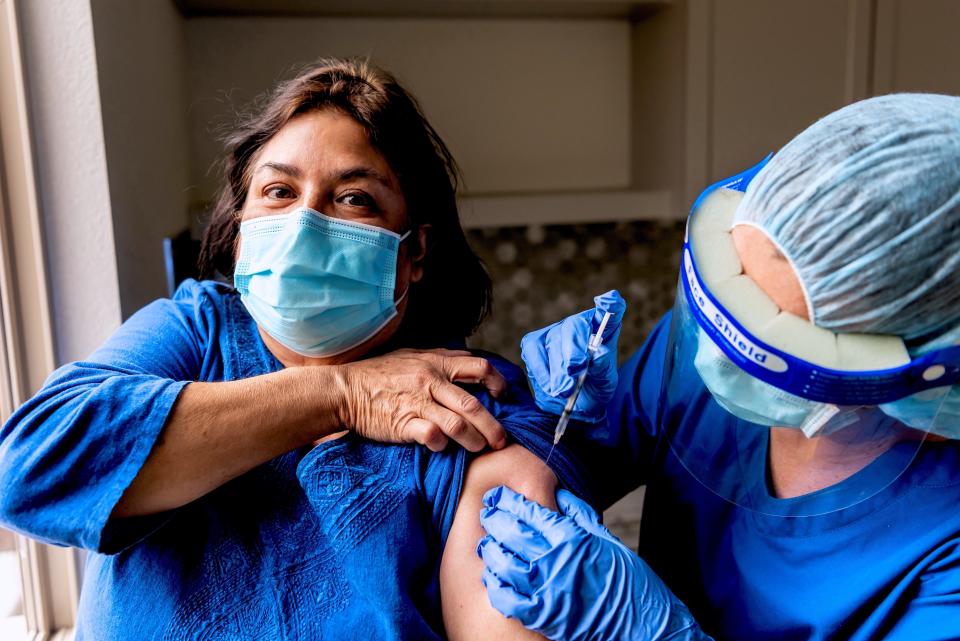
-
A new variant "Eris" is now the dominant strain of COVID-19 in the US, according to experts.
-
Eris, also known as EG.5, is estimated to make up 17.3% of US COVID-19 cases and is rapidly increasing.
-
Symptoms of Eris seem similar to other COVID-19 variants and include cough, shortness of breath, and fatigue.
A new coronavirus variant is rearing its head across the United States. Dubbed the "Eris" variant, it's descended from XBB — the same parent variant that spun off "the kraken" variant this past winter.
Eris, formally known as EG.5, only accounted for fewer than 1% of cases at the end of April, according to the Centers for Disease Control and Prevention (CDC). But it is now estimated to make up 17.3% of new US COVID-19 cases, says the CDC.
"It started off very slowly and then it seems to be picking up steam in terms of out-competing its predecessors," John Swartzberg, an infectious disease expert and professor emeritus at the University of California, Berkeley's School of Public Health, told Insider.
The COVID-19 variant was named for Eris, the Greek goddess of strife, by evolutionary biologist T. Ryan Gregory on Twitter. Eris is also the name of a dwarf planet in our solar system.
The name aligns with guidance from the World Health Organization to use "simple, easy-to-say labels" for COVID-19 variants using letters from the Greek alphabet.
But although there has been a dramatic uptick in the Eris variant, it does not appear to make people sicker than other variants, and symptoms of infection are similar to other COVID-19 strains.
Eris is now considered the dominant coronavirus strain in the US
Eris first emerged in February, and is an offshoot of the omicron variant XBB. But it really began to take off in July, during which its prevalence increased by 9.3% in the United States.
Scientists aren't yet sure why Eris is becoming more and more common, but its dramatic increase led the World Health Organization (WHO) to upgrade Eris from a "variant under monitoring" to a "variant of interest" on August 9. In other words, the WHO believes Eris poses an increased risk to global public health.
"Based on its genetic features, immune escape characteristics, and growth rate estimates, EG.5 may spread globally and contribute to a surge in case incidence," according to a recent WHO report,
"Everything we've seen to date with this variant suggests that it has properties that allow it to be a little more transmissible than its competitors," Swartzberg said, "We've not seen any evidence to date that it is more virulent. That is, it makes us sicker."
However, Swartzberg said our understanding of Eris is "still very early in the game — we haven't adequately been able to study enough people with EG.5 to know with certainty that it doesn't make us sicker, or conversely that it makes us less sick."
Symptoms of Eris seem similar to other coronavirus strains
So far, symptoms of Eris seem virtually identical to other coronavirus strains, according to Swartzberg. Eris, like other strains of COVID-19, can cause a loss of taste or smell, cough, fever, chills, shortness of breath, fatigue, body aches and headaches. Those most at risk include the elderly, people with compromised immune systems, and those with chronic diseases, said Swartzberg.
Eris may be more contagious than other strains, but it doesn't appear to be more deadly. Eris has not resulted in more deaths than the XBB strain of omicron, for example.
Still, the CDC reported a 12.5% rise in hospitalizations from COVID-19 at the end of July, a reminder that we should all remain cautious.
A new coronavirus booster could soon protect against Eris
A new coronavirus booster designed specifically to protect against XBB subvariants, like Eris, is being developed by pharmaceutical companies Pfizer, Moderna and Novavax. The new vaccines are slated to become available in October, and "should be very effective," said Swartzberg.
For now, experts urge people to make sure they are up-to-date on their coronavirus boosters. Only 43% of American adults over 65 are up-to-date with their COVID-19 vaccines, according to Swatzberg, and older adults are especially vulnerable to severe infection.
Additionally, people should wear N-95 masks and social distance when possible in indoor public spaces.
Read the original article on Insider
What we know about new COVID variant 'Eris,' from symptoms to how fast it's spreading - Yahoo Canada Shine On
Read More

No comments:
Post a Comment